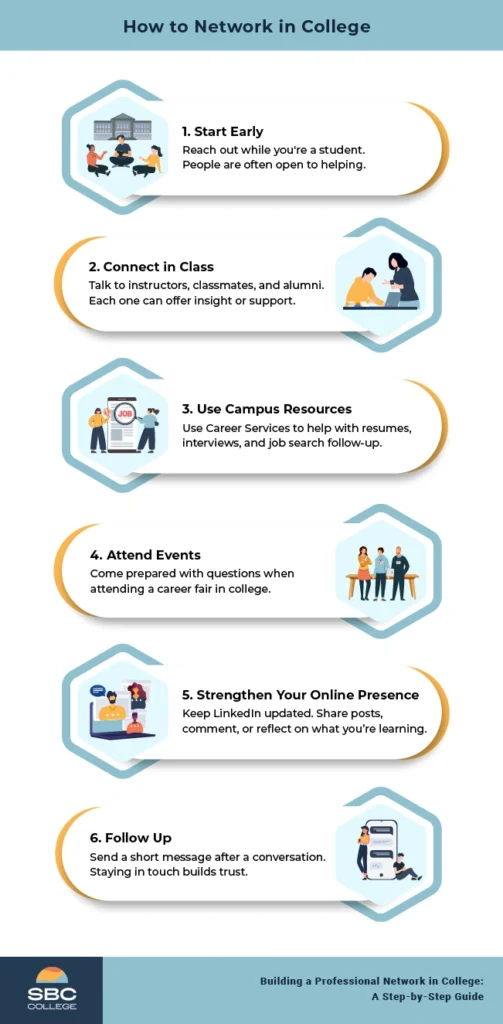Table of Contents
Networking with people from your diploma program can directly contribute to your career growth. It connects you with individuals who may offer advice, share job leads, or recommend you when opportunities arise. When you understand the importance of networking early on, you give yourself time to build relationships that can open doors when you’re ready to start your new career.
Let’s explore how you can start building those connections from day one, where to focus your efforts, and how to turn casual conversations into lasting professional relationships.
Listen to: Building a Professional Network in College: A Step-by-Step Guide
Why Networking Matters
Networking is one of the best ways to build career knowledge while you’re still in college. It helps you understand how different industries operate, what employers look for, and how others have built their careers. A conversation with a graduate might help you define your path. A classmate’s tip could lead to a practicum, event, or job that you wouldn’t have found otherwise.
Many roles never make it to job boards. Instead, employers often fill these roles through referrals, turning to people they, or their colleagues, already know and trust. By networking early in your program, you can build the kind of relationships that lead to job recommendations, references, and insider opportunities.
Networking supports student success by helping you build communication skills and gain practical insight into your field. Whether you’re following up with a guest speaker or contributing to class discussions, each interaction builds confidence and professionalism.
As your network grows, so does your ability to ask better questions, spot helpful resources, and recognize when to seek out opportunities instead of waiting for them to appear.
Start Early – Leverage Your Student Status
Being a student makes it easier to reach out to others. Whether you’re connecting with alumni, instructors, or professionals in your field, many are open to hearing from students who are learning and figuring out their new direction. That openness gives you a chance to build genuine connections without the pressure of already having all the answers.
You can start small. Ask a question during a Q&A session, introduce yourself after a talk, or join a study group where your classmates can share information and support each other.
These early conversations are the foundation of student networking and often grow into relationships that can support you during practicum, provide career advice, or even lead to job opportunities after graduation.
Everyday Networking – Instructors, Classmates, and Alumni
Networking doesn’t always come with name tags or business cards. It can happen through everyday conversations in class, during group work, or when you ask an instructor for feedback after a lecture. These interactions might seem casual, but they build trust and show your interest in learning.
At SBC College, instructors bring firsthand experience from the fields they teach. Getting to know them gives you a chance to hear how the work looks each day and understand how they progressed in their own careers. They can also suggest resources, refer you to contacts, or guide you toward roles that fit your strengths.
Classmates, too, are part of your future professional network. Peer networking during your program can lead to shared opportunities, collaboration, and long-term connections. Many classmates go on to work in related industries, and staying in touch helps you both learn and grow. Alumni connections, especially those active in school communities or invited back for events, can offer practical advice on how to prepare for interviews, stand out during your practicum, or find your first role after graduation.
Every interaction is a chance to learn, build rapport, and grow your network without even leaving the classroom.
Tap Into Career Services
At SBC College, Career Services is available from the moment you start your program. Whether you’re updating your resume, writing cover letters, or preparing for interviews, the team can help you get ready when opportunities come up.
You can also access employer referrals, job postings, career fairs, and on-campus recruitment events. These opportunities connect you directly with employers and help you explore where your skills fit.
And once you graduate, you can keep using these services whenever you need them.
Make the Most of Campus and Virtual Events

Campus events such as career fairs, guest lectures, and workshops can give you direct access to people already working in your field.
Janice T., the Communication & Career Strategies course instructor at SBC College, highlights the importance of asking questions during career fairs.
“A lot of students show up at career fairs thinking they need to impress employers. A better approach is to show genuine interest in their work. Ask what helped them grow in their career, what most grads overlook, or how they got started. Conversations like these don’t only give you fresh insights about the field but also help you stand out for the right reasons.”
Approaching events this way helps you build genuine connections—ones that can lead to advice, referrals, or future opportunities.
To make the most of these opportunities, take a few minutes beforehand to look up the speakers or companies attending. This helps you ask thoughtful questions and feel more prepared to start a conversation. During the event, introduce yourself, listen closely, and ask about their experience. Afterward, follow up with a short message to stay connected. See the Build and Maintain Your Online Presence section for LinkedIn tips.
If you’re attending an online event, the experience can be just as valuable. Virtual networking often feels more relaxed, and you still get to meet professionals, ask questions, and learn from the comfort of your home.
Build and Maintain Your Online Presence
Engaging in online networking helps people learn who you are and what you’re working toward. A good place to start is by creating a LinkedIn profile and keeping it up to date. This shows you’re active in your field and serious about your goals. Use your profile to highlight your diploma training, practicum placement, and any projects connected to the career you’re pursuing.
You can also stay visible by sharing an article, commenting on a classmate’s post, or reflecting on a recent assignment or experience. These small actions help you contribute to conversations and build your online presence.
When you meet someone through an event, class, or practicum, send a connection request with a short message. A brief, thoughtful note can lead to meaningful conversations down the line.
Your profile doesn’t have to include everything. What matters most is that it reflects your current interests and shows you’re open to learning and connecting.
Follow Up and Nurture Relationships
Once someone takes time to speak with you, the conversation doesn’t have to end there.
Janice T., Communication & Career Strategies course instructor at SBC College, often reminds students that thoughtful follow-up is part of building professional relationships:
“A good follow-up is more than a thank-you. It’s a chance to keep the conversation going—whether that means meeting again, asking more focused questions, or sharing details about how you’ve progressed since your last talk.”
Following up in this way sets the stage for a more meaningful connection.
You could invite them for coffee or ask if they’d be open to meeting again. If they agree, prepare a few specific questions related to their role or industry. Ask how they approached their first job search or what they wish they had known as a student. This kind of follow-up helps you learn while showing respect for their time.
Keep track of the people you’ve connected with during your program. Sending a short message or an occasional update shows you’re still interested in the connection.
Relationship building only happens through consistent efforts. Staying in touch shows that you value the connection and are serious about your goals.

Overcoming Common Barriers
Some students hold back from networking because they feel like they need more experience. Others worry about saying the wrong thing or assume people won’t have time to talk. While these thoughts are common, they don’t need to stop you from participating.
You don’t have to be outgoing or polished to start building connections. Many professionals remember what it felt like to be a student and are open to quick conversations or thoughtful questions.
If you’re one of many online students, you can still take part in meaningful conversations. Join virtual meetups, participate in class discussions, or send a short note to someone whose perspective stood out to you.
These moments don’t need to lead to anything right away. What matters is that you take the initiative to connect. Comfort builds each time you show up.
One conversation, one message, or one shared moment can open the door to something valuable. Each interaction during your program helps you learn, connect, and move closer to the career path you’re working toward.
Networking in college isn’t a one-time effort. It grows with each step you take.
To learn how your program supports networking, practicum connections, and job prep, contact an admissions advisor today.
Frequently Asked Questions (FAQ)
What are some easy conversation starters at networking events?
Try something simple like, “Hi, I’m [your name], I’m studying [your program]. What brought you here today?” At a career fair, asking “Can you tell me a bit about your company” or “What do you enjoy most about your work?” can help start a genuine conversation.
How can I use LinkedIn to expand my network as a student?
Begin by adding people you’ve met through class, events, or your practicum. When you send a request, include a short note to remind them how you met. You can also share posts about what you’re learning or reflect on a recent experience—that helps people see your interest and goals.
How do I maintain professional relationships over time?
Send a short note once in a while. Share an update about your program or thank them again if they gave you advice that helped. Small gestures like this show you’re thoughtful and still interested in staying connected.
What are the biggest mistakes to avoid when networking?
Here are a few networking mistakes to avoid:
- Trying to impress instead of having a genuine conversation.
- Waiting too long to reach out.
- Only connecting when you need something.
Instead, be genuinely curious, stay polite, and show interest in the other person. That’s what helps you build connections that last.
How do I approach networking if I’m shy?
Start with one small step. Say hello to someone after class or ask a question during a group discussion. If speaking up feels tough, send a short message later to continue the conversation. You don’t have to meet everyone. Just focus on one connection at a time. The more you do it, the easier it gets.






